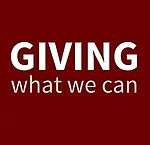Giving What We Can
Giving What We Can (GWWC) is an effective altruism associated organization whose members pledge to give 10% of their income to effective charities. It was founded at Oxford University in 2009 by the ethics researcher Toby Ord.
 | |
| Founded | 2009 |
|---|---|
| Founder | Toby Ord |
| Focus | Effective altruism |
| Location |
|
| Origins | Oxford, England |
Members | around 4,275 (2019) [1] |
Key people | Toby Ord (founder and president) William MacAskill (co-founder) |
Parent organization | Centre for Effective Altruism |
| Website | www |
History
Giving What We Can was founded as a giving society in 2009 by Toby Ord, an ethics researcher at Oxford, his wife Bernadette Young, a physician in training at the time, and fellow ethicist William MacAskill [2][3] with the goal of encouraging people to give 10% of their income on a regular basis to alleviate world poverty.[4] This is similar to zakat[5] or tithing but Ord said there was no religious motivation behind it.[6] Ord cited writings from Peter Singer and Thomas Pogge about one's moral duty to give to the poor as inspiration for starting the organization,[7] and personally planned to give away everything above about $28,000 a year, the median after-tax salary in the U.K.[8] His focus was on effective giving, meaning that he emphasized donations to charities which saved a maximal amount of life per donation amount.[9] GWWC was launched with 23 members.[8] People who joined signed a pledge to give away 10% of their income to any organization they thought could best address poverty in the developing world, and could pledge more; there was no penalty for quitting.[6] By the end of 2011 it had 177 members, mostly other academics, in five chapters including Oxford, Cambridge, Princeton, and Harvard.[8][10] By 2012 the group had 264 people from 17 countries,[11] and it surpassed 1,000 members in 2015.[2]
By November 2011 the organization was providing its members regular reports on what charities were most effective at addressing poverty in the developing world,[8] and at that time was recommending a tropical diseases group and a de-worming group that each worked in Africa.[12] Ord relied in part on research conducted by GiveWell, and also used the concept of the QALY to gauge effectiveness of charities.[13]
In 2011 a sister organization was spun off from Giving from What We Can at Oxford by MacAskill and others called "High Impact Careers" which encouraged people to pursue high-paying jobs so they could give more money away.[14][15][16] High Impact Careers was soon renamed to 80,000 Hours.[17] In 2012 the two organizations incorporated the Centre for Effective Altruism as a nonprofit to serve as an umbrella organization.[3][18]
Research
Giving What We Can conducts research to determine which charities it recommends for members and other people to support. It differs from other charity evaluators in terms of the importance given to metrics of charity performance. While evaluators such as Charity Navigator use the fraction of donations spent on program expenses versus administrative overhead as an important indicator, Giving What We Can solely focuses on the cost-effectiveness of the charity's work.[13][19] It believes that the variance in cost-effectiveness of charities arises largely due to the variance in the nature of the causes that the charities operate in, and therefore makes evaluations across broad areas of work such as health, education, and emergency aid before comparing specific organizations.[20] In practice, it recommends a selected few charities in the area of global health. Its work is therefore similar to that of GiveWell.[12]
References
- "Our Members Have Done Some Amazing Things". Giving What We Can. Retrieved 27 February 2018.
- MacFarquhar, Larissa (22 September 2015). "Extreme altruism: should you care for strangers at the expense of your family?". The Guardian.
- Singer, Peter (2015). The Most Good You Can Do: How Effective Altruism is Changing Ideas about Living Ethically. Yale University Press. p. 18. ISBN 9780300180275.
- "Academic pledges to give away £1m". BBC. 14 November 2009.
- "Editorial: Unthinkable? Giving 10%". The Guardian. 6 January 2012.
- Richard Woods (15 November 2009). "Take My Money, I Don't Want It". The Sunday Times.
- Gill, Martha (8 January 2013). "The man who gives away a third of his income. Would you give up a luxury to save a life?". New Statesman.
- Espinoza, Javier (28 November 2011). "Small Sacrifice, Big Return". Wall Street Journal.
- Geoghegan, Tom (13 December 2010). "Toby Ord: Why I'm giving £1m to charity". BBC News.
- Rustin, Susanna (23 December 2011). "The Saturday interview: Toby Ord and Bernadette Young on the joy of giving". The Guardian.
- Hellen, Nicholas (9 December 2012). "Oxford don sparks flood of charity cash". The Sunday Times.
- Mathieson, S. A. (11 June 2013). "How charity evaluators are changing the donations landscape". The Guardian. Guardian News and Media Limited. Retrieved 18 March 2017.
- Rosenberg, Tina (5 December 2012). "Putting Charities to the Test". Opinionator. The New York Times. Retrieved 18 March 2017.
- Younis, Musab (24 November 2011). "Helping the poor…by getting rich: ingenious or delusional?". Ceasefire Magazine.
- Cutterham, Tom (May 2012). "The Ethical Careers Debate" (PDF). Oxford Left Review (7): 4.
- Hamlett, Claire (July–August 2012). "The Philosophy of Giving". Philosophy Now (91).
- Shade, Robbie (22 November 2011). "80,000 Hours is launched!". Archived from the original on 18 March 2017.
- "Centre for Effective Altruism". UK Companies House. Retrieved 18 March 2017.
- "Charities in the ethical spotlight". www.ethicalconsumer.org. Ethical Consumer. Archived from the original on 19 March 2017. Retrieved 18 March 2017.
- "How We Assess Charities". Giving What We Can. Archived from the original on 3 July 2014. Retrieved 18 March 2017.